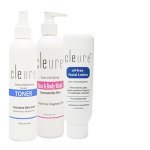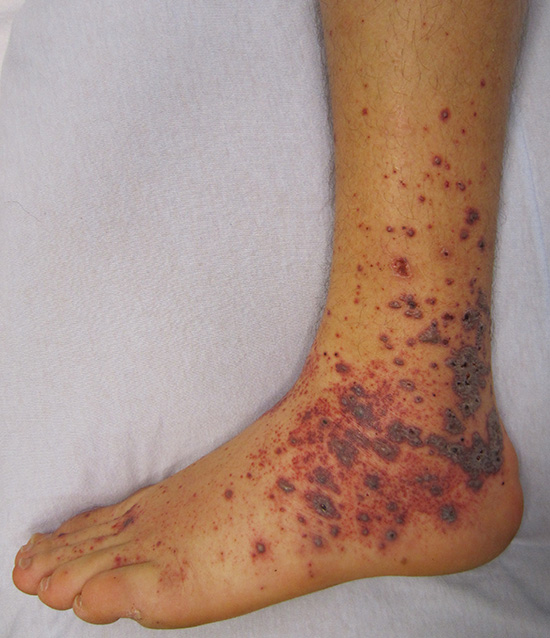Herbal Remedies for Acne
Which herbal remedies for acne are truly effective? Thankfully, there are several from which to choose, but it's a good idea to know and understand the properties and ingredients of each before making any purchase decisions.
Tea Tree Oil
Tea tree oil comes from a tree that is native to Australia, the Melaleuca alternifolia. This essential oil has natural antibacterial, anti-fungal, and anti-viral properties and has proven to be effective in helping to inhibit the appearance of acne.
People with sensitive skin should be careful to dilute pure tea tree oil with some aloe Vera gel prior to putting it directly onto the skin. The dilution should be a few drops of tea tree oil to a single ounce of aloe Vera gel.
Using the tea tree oil in its pure form could cause a rash, itchy skin, dry flaky skin, blisters, or even increased redness.
Lavender Oil
Lavender oil is often used in skin care products in conjunction with other natural ingredients to help treat acne, but shouldn't be used in pure form on the skin directly unless your physician or homeopathic professional has recommended that for you.
Why does lavender oil help acne-prone skin? It can act as an anti-inflammatory, prevent scars from acne breakouts, and encourage cell growth. It also seems to help balance out the natural oils skin produces, which encourages cleaner skin with fewer blemishes.
Bergamot Oil
This essential oil is also best for treating acne when combined with other ingredients in skin care products. Like lavender oil, never use bergamot oil without the express permission from your homeopathic professional or physician.
Properties of this oil include the ability to dry up blemishes and as an anti-bacterial treatment to kept skin cleaner.
Aloe Vera
You may know that Aloe Vera is used topically to treat burns and help calm sunburned skin, but did you know it could also be used to fight acne?
The easiest way to explain why aloe works to reduce the appearance of acne is to say that it contains polysaccharides which is a component that gives skin the boost it needs to heal itself and return to normal.
Aloe won't cure your acne, but it can be used to calm your skin and reduce the blotchiness, itchiness, and redness associated with acne. Simply apply it to the surface of your skin after thoroughly washing with a natural cleanser and allow to soak into the skin.
Rosewood Oil
People who suffer from extremely oily skin may benefit from using rosewood oil as a spot treatment for blemishes. It shouldn't be used as an all-over topical treatment for the skin, but is excellent for applying to breakouts.
One important note: rosewood oil can be irritating to sensitive skin or perpetually dry skin, so anyone with these types of skin should opt for different herbal remedies for acne.
Ginger
Ginger is the most effective when taken internally. It has wonderful anti-septic, anti-inflammatory, and immunity boosting properties. All of these are important when fighting acne!
Ginger naturally kills the bacteria that cause acne eruptions on the surface of the skin. It acts as an anti-inflammatory by keeping the hair follicles and sebaceous glands from secreting excess oil that would normally clog pores.
The immune systems of people with acne are typically compromised, which leads researchers to believe the two are connected. Ginger naturally gives the immune system an important boost.
Some homeopathic professionals may advise using ginger topically, but never should it be used directly on open wounds. You should consult your physician about taking it orally as well because an overdose of ginger could be toxic.
Witch Hazel
Witch hazel is one of the least expensive herbal remedies for acne available without a prescription. It's effective for treating acne because it contains powerful antioxidants that cleanse the skin, anti-inflammatory properties, which keep acne from developing, anti-bacterial properties to keep the skin cleaner, and naturally moisturizes the skin.
Witch hazel should only be used topically as an astringent. Never ever take it internally.
It's important to note that people with sensitive skin or rosacea should not use witch hazel on their skin. It tends to be a drying agent and can actually cause skin irritation for people with these skin conditions.
Neem
Neem oil, neem soap, and neem lotion can help some people who suffer from acne. It's an herb with anti-bacterial properties that will kill the bacteria responsible for causing acne on the skin.
That said; it's important to note a few things about neem products. First, they are not all the same and could contain different ingredients from product to product. Neem naturally contains ingredients that are similar to ingredients used in prescription acne medications.
One such ingredient is salicylic acid. This is an ingredient that can cause irritation to the skin for people with rosacea and those with sensitive skin, so it's wise to check the labels of any neem products before purchasing them.
Some people have found neem to be their answer for controlling their acne, but others found it irritated their skin.
Synergy and Using Herbal Remedies for Acne
We should point out that there could be benefits from using several different acne treatments together. Some products combine herbs that work synergistically with one another - in harmony so to speak.
There are others however that may cause adverse reactions when used together, so it's wise to consult your physician, homeopathic doctor, or to conduct thorough research before making any treatment decisions.
Homeopathic and Herbal Remedies for Acne
These three products all contain a blend of natural ingredients that have helped some people with their acne-prone skin.
MediAc is a homeopathic treatment for addressing acne not only on the face, but also on any area of the body that is affected. It's great for regulating natural oils, fighting bacteria, and can help reduce the appearance of red, blotchy, and bumpy skin.
Clear Skin Acne Gel is a gel applied after cleansing the skin that helps to protect the skin from bacteria, balances out the natural pH level of the skin, and helps to control acne breakouts. The all-natural ingredients are usually safe for most skin types.
Clear Skin Wash is an all-natural facial wash that naturally fights bacteria and cleanses the skin without drying it out. It also leaves a protective barrier on the skin to keep new bacteria from invading the pores.
Using these products together as natural herbal remedies for acne has worked for some people very effectively.
Home > Acne Sensitive Skin Treatment > Herbal Remedies for Acne









New! Comments
Share your thoughts about what you just read! Leave me a comment in the box below.